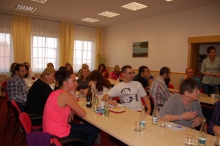Motivating young workers to join unions in Czech Republic

During a workshop on the first day, the Czech Moravian Confederation of Trade Union (CMKOS) introduced new resources that address the issue of young workers’ reluctance to join a trade union and how trade unions should respond.
Some young workers believe that trade unions are still pro-government and closely related to the communist party. There is also a difficulty in accepting the concept that benefits obtained through the collective agreements apply to all workers, regardless of their trade union membership. Similarly, some members expect a financial return on investment whereas trade unions are based on solidarity and only provide financial assistance in particular cases (arbitrary dismissals, workplace accidents, childbirth, long term sicknesses…). People also hesitate to join a trade union through the fear of discrimination or dismissal for being a member of the union.
On the second day of the seminar, Ladislav Kucharský, Vice President of the Czech Trade Union of Health and Social Services, gave a presentation on how to use criticism in a constructive manner and how to respond to fair or unfair criticism in a positive way. This presentation was followed by a short session with Ludmila Pazderová, who went through the most common trade union terms, and their equivalent in English.
The participants returned to their unions with new ideas on how to promote trade unionism in their workplace and with more knowledge on how to participate actively in union negotiations such as collective bargaining.

